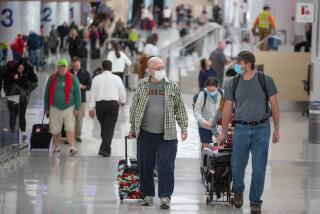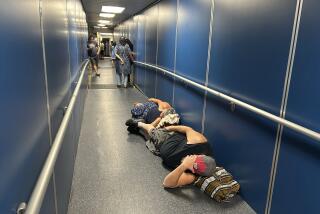AT&T; Tells FCC of Its Plan to Avoid Outages in Future
WASHINGTON — AT&T; told federal regulators Monday that the company is taking steps to prevent future interruptions similar to the breakdown that disconnected most of New York’s long-distance service two weeks ago.
“The Sept. 17 failure was not the result of an inherent flaw in any system or resource,” said AT&T; Senior Vice President Kenneth Garrett in a letter to Alfred Sikes, chairman of the Federal Communications Commission. “Rather, it resulted from a combination of highly unusual circumstances that became a problem because AT&T;’s existing procedures were not followed.”
American Telephone & Telegraph, by far the nation’s largest long-distance company, made the letter public on the eve of a congressional hearing into the outage. The House Energy and Commerce Committee’s telecommunications and finance subcommittee scheduled its hearing this morning.
Garrett was responding to a Sept. 20 letter that Sikes wrote to AT&T; Chairman Robert Allen, asking him to submit by Monday a written report on the outage.
“The report should not only address this incident in a comprehensive manner but also should explain what steps have been and are being taken to avoid such problems in the future,” Sikes said in his letter.
“We are deeply distressed by the lapses in procedure that led to the recent problem,” said Garrett, who is in charge of AT&T;’s network. “Thus, we are now re-examining our procedures to identify additional steps which AT&T; can take to prevent similar occurrences.”
The disruption blocked long-distance calls to and from New York on AT&T;’s network for seven hours and brought traffic at the city’s three busy airports to a virtual standstill. Flights nationwide were affected.
It was a major embarrassment for a company that sells itself on reliability.
AT&T; said the problem occurred after a key Manhattan phone-switching center changed from its regular commercial electric power to an in-house generator. The generator failed--without the center’s workers knowing--and the center automatically switched to batteries. The batteries died after six hours, cutting power to phone switches.
AT&T; blamed the outage on employees.
“We are deeply distressed by the lapses in procedure that led to the recent problem,” Garrett’s letter to Sikes said.
To avoid future problems, he said, the company is:
* Testing alarm systems at its “most critical” offices and at all locations with the same power plant configuration as the one that failed. The check includes visual and audible alarms, he said.
* Completing the replacement of older power plants, which already was under way. He said the job should be completed by year-end in the New York metropolitan area and by next June in other critical facilities. He said AT&T; has set aside $150 million for the work in 1991.
* Working with the Federal Aviation Administration on a plan to provide additional backups.
Some experts said they were surprised that AT&T; did not have a better backup systems for its network.
The outage was the third major service disruption for AT&T; in two years and could cost the company some customers, experts said.
A computer software glitch in the phone switches caused a nationwide phone outage in January, 1990, and last January, AT&T; workers in New Jersey accidentally severed the company’s major phone link to New York, shutting down some of the nation’s financial markets and causing problems with the FAA’s radar system.
More to Read
Inside the business of entertainment
The Wide Shot brings you news, analysis and insights on everything from streaming wars to production — and what it all means for the future.
You may occasionally receive promotional content from the Los Angeles Times.










